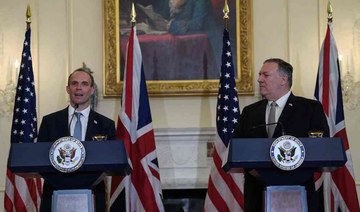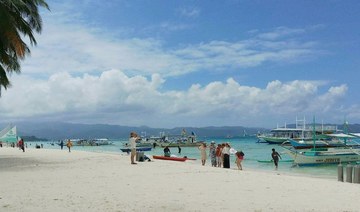WASHINGTON: The Trump administration declared Saturday that all UN sanctions against Iran have been restored, a move most of the rest of the world rejects as illegal and sets the stage for an ugly showdown at the world body ahead of its annual General Assembly.
The administration said that its triggering of the “snapback” mechanism in the UN Security Council resolution that enshrined the 2015 Iran nuclear deal had taken effect at 8 p.m. Eastern Time. That is 30 days after Secretary of State Mike Pompeo notified the council that Iran was in “significant non-performance” with its obligations under the accord, known as the Joint Comprehensive Plan of Action, or JCPOA.
“The United States took this decisive action because, in addition to Iran’s failure to perform its JCPOA commitments, the Security Council failed to extend the UN arms embargo on Iran, which had been in place for 13 years,” Pompeo said in a statement released at precisely 8 p.m.
“In accordance with our rights ... we initiated the snapback process to restore virtually all previously terminated UN sanctions, including the arms embargo,” he said. “The world will be safer as a result.”
The White House plans to issue an executive order on Monday spelling out how the US will enforce the restored sanctions, and the State and Treasury departments are expected to outline how foreign individuals and businesses will be penalized for violations.
“The United States expects all UN, member states to fully comply with their obligations to implement these measures,” Pompeo said. “If UN, member states fail to fulfill their obligations to implement these sanctions, the United States is prepared to use our domestic authorities to impose consequences for those failures and ensure that Iran does not reap the benefits of UN-prohibited activity.”
But the US move faces stiff opposition from the other members of the Security Council who have vowed to ignore it. They say the US lost legal standing to invoke snapback when President Donald Trump withdrew from the nuclear deal in 2018 and reimposed American sanctions on Iran. The US argues it retains the right to do it as an original participant in the deal and a member of the council.
Even before the US declaration, fellow Security Council members said the declaration had no legal force, calling into question the ability to enforce snapback. Snapback means that international sanctions eased or lifted by the nuclear deal are reimposed and must be enforced by UN member states, including hitting Iran with penalties for uranium enrichment to any level, ballistic missile activity and buying or selling conventional weapons.
Those bans were either removed or set to expire under the terms of the deal in which Iran was granted billions of dollars in sanctions relief in return for curbs on its nuclear program.
China and Russia have been particularly adamant in rejecting the US position, but US allies have not been shy either. In a letter sent Friday to the president of the Security Council, Britain, France and Germany — the three European participants who remain committed to the deal — said the US announcement “is incapable of having legal effect and so cannot bring in to effect the procedure.”
“It flows from this that any decisions and actions which would be taken based on this procedure or on its possible outcome would also be incapable of having any legal effect,” they wrote. Thus, the three countries said, the sanctions relief provided by the nuclear deal will remain in place.
US officials have talked tough about their intentions to ensure the sanctions are enforced, but it remains unclear how the administration will respond to being ignored, particularly by its European allies, which have pledged to keep the nuclear deal alive. A wholesale rejection of the US position could push the administration, which has already withdrawn from multiple UN agencies, organizations and treaties, further away from the international community.
In the midst of a heated campaign for reelection, Trump plans to address Iran in a speech to the General Assembly’s annual high-level meeting on Tuesday. Officials say he will also touch on his brokering of agreements for Israel and the United Arab Emirates and Bahrain to normalize relations in part to solidify a regional bulwark against Iran.
And, as he seeks to demonstrate statesmanlike credentials ahead of the election, Trump has injected another element of uncertainty into the mix by threatening to retaliate “1,000 times” harder against Iran if it attacks US personnel overseas.
Iran earlier Saturday warned that it may still strike US interests to avenge the death of a top Iranian general in an American airstrike earlier this year. But the head of the country’s Revolutionary Guard Corps mocked a report that it was plotting to assassinate the US ambassador to South Africa, saying Iran’s response would target people directly or indirectly involved in the general’s death.
Amid uncertainty over that, the other 14 members of the Security Council and all but about five of the UN‘s 195 member states say the US lost its legal standing to act on sanctions when Trump withdrew from the nuclear accord more than two years ago.
Pompeo traveled to the United Nations on Aug. 20 to formally notify the Security Council that the US was triggering snapback because Iran is not complying with the nuclear deal. He dismissed suggestions that the administration was engaged in anything legally questionable or even controversial.
He has said the snapback mechanism was the “one thing that the previous administration got right” in the nuclear deal that Trump has denounced as the worst deal ever negotiated. Yet, aside from Israel and the Gulf Arab states, almost no country in the world agrees with the US
Trump administration officials have been attacking the 2015 nuclear deal for years. They say it is fatally flawed because certain restrictions on Iran’s nuclear activity gradually expire and will allow the country to eventually develop atomic weapons.
The immediate concern of the US has been the indefinite extension of the arms embargo that would otherwise expire on Oct. 18. The Security Council rejected a US effort to extend the embargo in a lopsided vote which saw the United States get support from only one country, the Dominican Republic.
US says all UN sanctions on Iran restored
https://arab.news/ryf8z
US says all UN sanctions on Iran restored
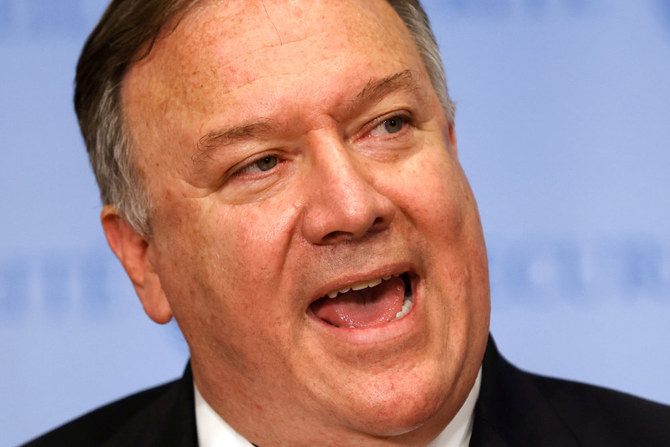
- “Snapback” mechanism in the UN Security Council resolution that enshrined the 2015 Iran nuclear deal had taken effect at 8 p.m. Eastern Time, says Pompeo
Philippines seeks to position itself as top tourism destination at Arabian Travel Market
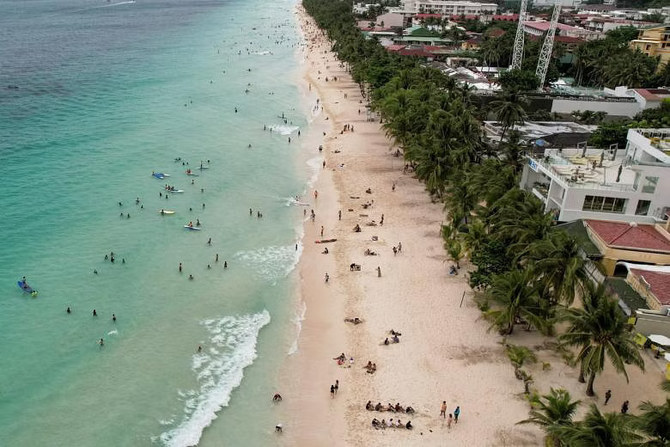
- Philippines has recorded 10 percent increase in visitors arriving from Gulf countries this year
- The country wants to become a preferred destination in Asia and the world
MANILA: The Philippines is working to attract more visitors from the Middle East and position itself as a preferred destination for international travelers, its tourism stakeholders said ahead of the Arabian Travel Market in Dubai.
More than 2,300 exhibitors and delegates from over 165 countries are joining the annual Arabian Travel Market, which this year will take place from May 6 to 9 at the Dubai World Trade Center.
In the Philippines, known for its white sandy beaches, diving spots and diverse culture, tourism is a key sector, contributing nearly 13 percent, or about $44 billion, to its gross domestic product in 2019.
The Department of Tourism will be leading the Philippine delegation in Dubai, as officials set their eyes on promoting the country’s best tourism to the international market.
“We look forward to these opportunities to share the Filipino story to the rest of the world … and to reinforce the Philippines’ position as a preferred destination and top-of-mind choice for travelers,” Secretary of Tourism Christina Garcia Frasco said in a statement.
With its participation at the Arabian Travel Market, the Philippines hopes to sustain the momentum from increased tourist arrivals from the Middle East, she added.
The Philippine tourism industry will not only promote their strengths, such as their tropical and natural attractions, but also diverse offerings in gastronomy and culture, as well as the Filipino tourism workers, “who serve as our best asset for their distinct hospitality and warmth,” Frasco said.
The Philippines has welcomed more 2 million international travelers since the beginning of the year, according to data from the tourism department. This includes a 10 percent increase in visitors arriving from Gulf countries, especially Saudi Arabia and the UAE, which has been among the Philippine government’s key emerging-market targets.
“There’s been a remarkable surge in outbound tourism from the Middle East, particularly from Gulf Cooperation Council countries … We see a growing appetite for international travel among GCC citizens and we see this trend continuing to rise in the coming years,” said Maria Margarita Montemayor Nograles, chief operating officer of the Tourism Promotions Board.
“This is one of the major reasons why we are doubling down on our efforts to maintain and enhance our presence in the Middle East. With our continued participation at the ATM, we aim to position the Philippines as a top-of-mind destination in Asia.”
Tourists from the Middle East are growing more important for some Filipino tourism operators, and represent a significant segment of their clientele, said Manih Karay, president of CTPH Tour.
“To appeal to tourists from Arab countries and promote the Philippines, we highlight the country’s natural beauty, rich cultural heritage, and warm hospitality … Their interest in exploring new destinations and cultural experiences aligns well with our commitment to providing inclusive and diverse travel services,” Karay told Arab News.
Arab tourists also contribute to the growth of the Philippines’ tourism industry, Karay said, adding that they foster cultural exchange and economic development.
“Their visits not only enrich our travel experiences but also promote mutual understanding and appreciation among different cultures,” she said.
Suspected Kashmir rebels kill Indian air force corporal
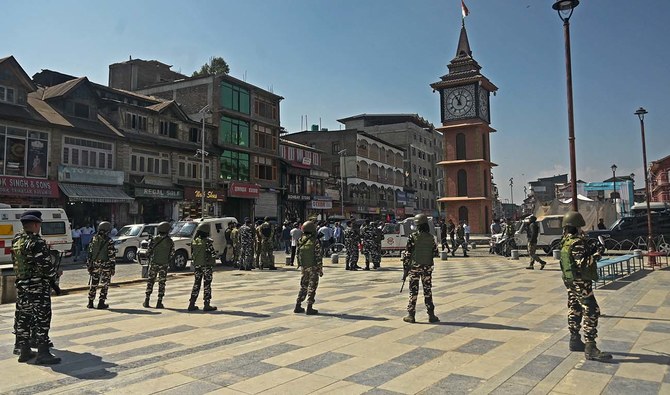
- Suspected rebels ambushed military convoy in Indian-administered Kashmir, Indian Air Force says
- Since 1989, rebel groups opposed to Indian rule have waged insurgency in disputed territory
SRINAGAR, India: An Indian air force member was killed and four more injured when suspected rebels ambushed a military convoy in Indian-administered Kashmir, an official statement said, as campaigning for national elections continues in the disputed territory.
The convoy was attacked by an unknown number of armed militants who sprayed automatic rifle fire toward at least one air force truck in the mountainous Poonch area, 200 kilometers (124 miles) south of the main city of Srinagar, the air force said in a statement.
Five air force personnel were hit in the firefight late Saturday and “one Air Warrior succumbed to his injuries later,” it said, identifying the dead man as a corporal.
A neighboring constituency took part in the first phase of India’s general election on April 19, and Poonch voters were originally scheduled to cast their ballots this week but the Election Commission of India has postponed the polling to May 25 because of inclement weather in recent days.
Kashmir has been divided between India and Pakistan since their independence in 1947, with both claiming the high-altitude territory in full but administering it in parts.
Since 1989, rebel groups opposed to Indian rule have waged an insurgency in Indian-controlled Kashmir, demanding either independence or a merger with Pakistan.
The conflict has left tens of thousands of civilians, soldiers and militants dead.
Rebel activity in the territory has registered an uptick since last month as campaigning for the elections picked up in the restive region.
In April, three suspected rebels were killed and a police officer and three soldiers wounded in three separate clashes across the territory.
Violence has drastically dropped since 2019, when Prime Minister Narendra Modi’s government revoked the region’s limited autonomy and stepped up a security chokehold.
Voting in India’s six-week-long national election, which started last month, will end on June 1.
Driver dies after crashing into White House perimeter gate, Secret Service says

- The driver was not immediately identified
WASHINGTON: A driver died after crashing a vehicle into a gate at the White House Saturday night, authorities said.
The driver was found dead in the vehicle following the crash shortly before 10:30 p.m. at an outer perimeter gate of the White House complex, the US Secret Service said in a statement.
Security protocols were implemented but there was no threat to the White House, the agency said.
The driver was not immediately identified.
The Secret Service will continue to investigate the matter, while turning over the fatal crash portion of the investigation to the Washington Metropolitan Police Department, the agency said.
Fake videos of Modi aides trigger political showdown in India election

- Indian police arrest nine people for circulating fake video of Indian Home Minister Amit Shah
- With more than 800 million Internet users, tackling misinformation in India is a huge challenge
BENGALURU/LUCKNOW: Manipulated videos are taking center stage as campaigning heats up in India’s election, with fake clips involving two top aides of Prime Minister Narendra Modi triggering police investigations and the arrest of some workers of his rival Congress party.
In what has been dubbed as India’s first AI election, Modi said last week fake voices were being used to purportedly show leaders making “statements that we have never even thought of,” calling it a conspiracy “to create tension in society.”
Indian police — already investigating the spread of fake videos showing Bollywood actors criticizing Modi — are now investigating a doctored online clip that showed federal home minister Amit Shah saying the ruling Bharatiya Janata Party will stop certain social guarantees for minorities, a subject sensitive for millions of voters.
Shah retorted on X, posting his “original” and the edited “fake” speech and alleging — without providing any evidence — that the main opposition Congress was behind the video it created to mislead the public. The minister said “directions have been issued to the police to address this issue.”
Indian police arrested at least nine people, including six members of Congress’ social media teams, in the states of Assam, Gujarat, Telangana and New Delhi last week for circulating the fake video, according to police statements.
Five of the Congress workers were released on bail, but the most high-profile arrest made by the cybercrime unit of New Delhi police came on Friday, when they detained a Congress national social media coordinator, Arun Reddy, for sharing the video. New Delhi is one region where Shah’s ministry directly controls police. Reddy has been sent into three-day custody.
The arrest has sparked protests from Congress workers with many posting on X using the #ReleaseArunReddy tag. Congress lawmaker Manickam Tagore said the arrest was an example of “authoritarian misuse of power by the regime.”
Congress’ head of social media, Supriya Shrinate, did not respond to messages and an email seeking comment.
MISINFORMATION
India’s election from April 19 to June 1 will be the world’s largest democratic event. With nearly a billion voters and more than 800 million Internet users, tackling the spread of misinformation is a high stakes job. It involves round-the-clock monitoring by police and election officials who often issue take down orders to Facebook and X as investigations start.
In India’s most populous state of Uttar Pradesh, more than 500 people keep tabs on online content, flagging controversial posts and coordinating with social media companies for their removal when needed, police chief Prashant Kumar told Reuters on Saturday.
Another fake video that sparked a storm last week showed Yogi Adityanath, the state’s chief minister, criticizing Modi for not doing enough for families of those who died in a 2019 militant attack. Though fact checkers said the video was created using different parts of an original clip, state police called it an “AI generated, deepfake.”
Using Internet address tracking, state police arrested a man named Shyam Gupta on May 2 who had shared the fake video post on X a day earlier, receiving over 3,000 views and 11 likes.
The police have accused Gupta of forgery and promoting enmity under Indian law provisions that can carry a jail term of up to seven years if convicted. Reuters could not reach him as he is currently serving a 14-day custody period.
“This person is not a tech guy. Had he been tech savvy, arresting him quickly would not have been possible,” said police officer Kumar.
Australian police shoot boy dead after stabbing with ‘hallmarks’ of terrorism

SYDNEY,: Australian police said on Sunday they had shot dead a boy after he stabbed a man in Western Australia’s capital Perth, in an attack authorities said indicated terrorism.
There were signs the 16-year-old, armed with a kitchen knife, had been radicalized online, state authorities said, adding they received calls from concerned members of the local Muslim community before the attack, which occurred late on Saturday night.
The attack, in the suburb of Willetton, had “hallmarks” of terrorism but was yet to be declared a terrorist act, police said.
“At this stage it appears that he acted solely and alone,” Western Australia Premier Roger Cook told a televised press conference in the state capital Perth, regarding the attacker.
The victim, stabbed in the back, was stable in hospital, authorities said.
Prime Minister Anthony Albanese said he had been briefed on the incident by police and intelligence agencies, which advised there was no ongoing threat.
“We are a peace-loving nation and there is no place for violent extremism in Australia,” Albanese said on social media platform X.
The incident comes after New South Wales police last month charged several boys with terrorism-related offenses in investigations following the stabbing of an Assyrian Christian bishop while he was giving a live-streamed sermon in Sydney, on April 15.
The attack on the bishop came only days after a stabbing spree killed six in the Sydney beachside suburb of Bondi.
Gun and knife crime is rare in Australia, which consistently ranks among the safest countries in the world, according to the federal government. (Reporting by Sam McKeith in Sydney; Editing by Christian Schmollinger and William Mallard)



